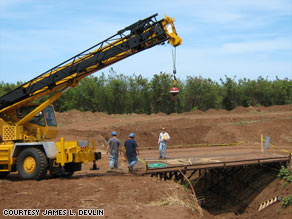Government Accountability Office warns of service disruptions to the GPS satellites; Points finger at U.S. Air Force for delays in modernization process
Big government’s inefficiency comes in a variety of flavors, and this one could hit your dashboards as early as next year. According to a report from the Government Accountability Office (GAO), the U.S.’ Global Positioning System (GPS) could begin to experience black-outs and general failures next year due to the delays, mismanagement and underinvestment by the U.S. Air force.
The report’s summary offers the following: The Global Positioning System (GPS), which provides position, navigation, and timing data to users worldwide, has become essential to U.S. national security and a key tool in an expanding array of public service and commercial applications at home and abroad. The United States provides GPS data free of charge. The Air Force, which is responsible for GPS acquisition, is in the process of modernizing GPS. In light of the importance of GPS, the modernization effort, and international efforts to develop new systems, GAO was asked to undertake a broad review of GPS. Specifically, GAO assessed progress in (1) acquiring GPS satellites, (2) acquiring the ground control and user equipment necessary to leverage GPS satellite capabilities, and evaluated (3) coordination among federal agencies and other organizations to ensure GPS missions can be accomplished. To carry out this assessment, GAO’s efforts included reviewing and analyzing program documentation, conducting its own analysis of Air Force satellite data, and interviewing key officials.
It is uncertain whether the Air Force will be able to acquire new satellites in time to maintain current GPS service without interruption. If not, some military operations and some civilian users could be adversely affected. (1) In recent years, the Air Force has struggled to successfully build GPS satellites within cost and schedule goals; it encountered significant technical problems that still threaten its delivery schedule; and it struggled with a different contractor. As a result, the current IIF satellite program has overrun its original cost estimate by about $870 million and the launch of its first satellite has been delayed to November 2009–almost 3 years late. (2) Further, while the Air Force is structuring the new GPS IIIA program to prevent mistakes made on the IIF program, the Air Force is aiming to deploy the next generation of GPS satellites 3 years faster than the IIF satellites. GAO’s analysis found that this schedule is optimistic, given the program’s late start, past trends in space acquisitions, and challenges facing the new contractor. Of particular concern is leadership for GPS acquisition, as GAO and other studies have found the lack of a single point of authority for space programs and frequent turnover in program managers have hampered requirements setting, funding stability, and resource allocation. (3) If the Air Force does not meet its schedule goals for development of GPS IIIA satellites, there will be an increased likelihood that in 2010, as old satellites begin to fail, the overall GPS constellation will fall below the number of satellites required to provide the level of GPS service that the U.S. government commits to. Such a gap in capability could have wide-ranging impacts on all GPS users, though there are measures the Air Force and others can take to plan for and minimize these impacts. In addition to risks facing the acquisition of new GPS satellites, the Air Force has not been fully successful in synchronizing the acquisition and development of the next generation of GPS satellites with the ground control and user equipment, thereby delaying the ability of military users to fully utilize new GPS satellite capabilities. Diffuse leadership has been a contributing factor, given that there is no single authority responsible for synchronizing all procurements and fielding related to GPS, and funding has been diverted from ground programs to pay for problems in the space segment. DOD and others involved in ensuring GPS can serve communities beyond the military have taken prudent steps to manage requirements and coordinate among the many organizations involved with GPS. However, GAO identified challenges in the areas of ensuring civilian requirements can be met and ensuring GPS compatibility with other new, potentially competing global space-based positioning, navigation, and timing systems.
Click here to download the report. For those who like to read without leaving the page, here is the read-only version of the PDF.


